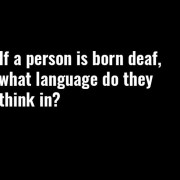What employers can learn from a supermarket’s interview mistake
Use an appropriate communication service for the deaf interview

When I turned 18 I went on my first job interview. Waitressing at our local restaurant seemed appropriate for a newbie such as myself. I had never been interviewed before. My mom and I role played for hours, trying to cover every conceivable question. On the day of my interview I dressed in my Sunday best and drove to the restaurant.
My heart was beating so loud I barely heard the interviewer introduce himself. His office smelled of furniture polish and oatmeal, the florescent light adding no friendliness to the windowless room. My palms felt clammy and I became very aware of my posture. When the interviewer asked where I saw myself in five years, I blurted out “hopefully not in this room”.
It was an awful experience. My first job interview was awkward and scary. Now, imagine this scenario and you’re deaf. Worse still, imagine going for your first ever job interview and the interviewer didn’t know you were deaf. That’s what happened to James Blake.
James and the Brighton supermarket
James applied for a shelf-stacking job at the Asda branch at Brighton Marina and on Tuesday, 26 July 2016, was invited for an interview. A few minutes after James was called in, the interviewer asked to speak to James’s mom. Apparently they had not reviewed James’s application properly and missed where he had stated that he was deaf.
Unprepared and probably a bit embarrassed, the interviewer carried on with the interview, while Mrs Blake tried her best to act as interpreter. Brighton and Hove News reported that Mrs Blake felt James had been put at a disadvantage because it was difficult to translate the group discussions and have James participate in the exercises.
“I was totally humiliated as James didn’t know what he (the interviewer) had said and felt he was implying James wasn’t making any contributions to the group.”
A few minutes after arriving home, James received an email from Asda letting him know he hadn’t gotten the job. Luckily this story has a happy ending. James was invited for another interview, this time at Sainsbury’s. An interpreter was immediately arranged and James was offered the job two days later.
Deaf interview training
I think we can all agree that such an incident should never have occurred. We presume James’s application was reviewed before he was invited for an interview, and the interviewer should have been prepared. However, we don’t know the full extent of the situation or what happened leading up to the interview.
James is lucky to have such a supportive family and mother, but the experience could easily have crushed the young man’s spirit, discouraging him from applying for future opportunities. The Brighton supermarket received severe criticism, resulting in bad publicity. We encourage all companies and employers to institute training on diversity and disability so that such incidents are less likely to occur.
Be pre-emptive and understand what deaf job hunters might need before publishing a job opening. It’s every employer’s responsibility to give opportunities to deaf candidates. Below are some tips on how to interview a deaf applicant.
Preparing for the deaf interview: Schedule communication support
When scheduling the interview, check with the interviewee if they have any communication preferences and requirements.
- Once you have confirmation of the date and time of the interview, book the type of communication support (e.g. interpreter, captioner or lipspeaker) well in advance. 121 Captions can assist in ensuring interviewees are fully involved with discussions.
- Use a reputable agency for your communication service for the deaf. Review the agency first, see what other users have said about their services.
- Prepare your chosen communication support provider for the deaf person. Provide them with the day’s agenda, a list of questions you’ll be asking candidates, and any supporting material you feel might be useful.
- Have the communication support provider arrive an hour or two before the candidates. Get them set up and settled before the interview(s) starts.
Conducting the deaf interview: Put them at ease
The deaf interviewee will be nervous, perhaps even more so than a hearing candidate. They’re worried how their deafness will be perceived and if they’re communicating clearly enough.
Do’s
- Smile and have a friendly face. Remember your body language is doing a lot of the talking.
- Speak one at a time, making sure to look directly at the deaf person when speaking, even if they have a lip speaker, note taker or captioner in the room.
- Focus on the interviewee, not the communication support provider.
- If you have a beard or moustache, make sure the hard of hearing interviewee is able to understand you.
- Do indicate when another person is speaking, for example: ‘Mr Thompson would now like to ask you a few questions.’
- In the event of a group exercise, make sure the candidate(s) are able to clearly see the speaker and understand the instructions. We suggest having these instructions typed up beforehand.
- Do ask the if you may explain to the group that they’re deaf and what the communication support provider’s role is. They may not want to disclose this.
- If you’re doing telephonic interviews, offer them the options of Skype video, so the deaf candidate can read your lips and see your expressions. Make use of the Skype writing function if video is proving to be difficult.
- Always offer a face-to-face interview with a hard of hearing job hunter.
Don’ts
- Don’t ask them about how they became deaf, focus on their ability to do the job well.
- Don’t ramble. Deaf people are trying to translate what they see, while simultaneously thinking about responding to your question.
- Don’t treat them differently or mock their disability. “I can do most things a hearing person can do – I’m deaf, not daft.” – Tina Lannin.
- Don’t turn away from the deaf interviewee when speaking to them and don’t walk around the room. They’re trying to watch your face and follow your cues.
Conclusion
Deaf people should not be deprived of the opportunity to work merely because your company failed to prepare for the possibility of a deaf interviewee. Ensure your company’s reputation remains in good standing by reviewing each application properly and make appropriate adjustments to put the deaf candidate at ease. Download our free ebook to improve your understanding of deaf and hard of hearing employees, positioning yourself as the employer that cares.
Contact us if you’d like to know more about securing a communication service for the deaf or how your company can help support deaf / hard of hearing candidates and employees.











Great post. It’s always a challenge when going in for an interview whether it is an entry-level part time job or a senior management salaried position. Both sides really only have that “one interview in a career opportunity” and it would be a loss to both of them should there be a miscommunication issue.
I never really thought about how live captioning can help in an interview environment so I appreciate you sharing this with us.